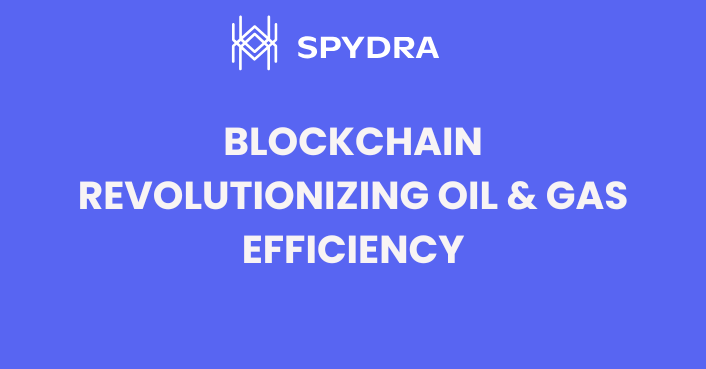Streamlining the Oil & Gas Industry: Blockchain for Energy (B4E) Leads the Way in Multi-Party Innovation

The oil and gas industry is embracing groundbreaking technologies to enhance efficiency, transparency, and collaboration. At the forefront of this revolution stands Blockchain for Energy (B4E), a consortium driving multi-party innovation across the energy sector. With the global blockchain in oil and gas market projected to skyrocket from $100.8 million in 2022 to a staggering $7198.72 million by 2030, it’s clear that this technology is not just a passing trend but a fundamental shift in how the industry operates.
The Power of Blockchain in Oil and Gas
Blockchain technology is revolutionizing the oil and gas industry by providing a secure, transparent, and immutable ledger for transactions and data management. This decentralized system offers numerous benefits, including:
- Enhanced supply chain transparency
- Improved contract management
- Streamlined regulatory compliance
- Reduced operational costs
- Increased trust among stakeholders
As a result, 81% of the world’s leading public companies are now utilizing blockchain technology, with the oil and gas sector rapidly catching up.
B4E: Pioneering Multi-Party Innovation
Blockchain for Energy (B4E) has emerged as a trailblazer in the industry, fostering collaboration among major players to develop blockchain solutions tailored for the energy sector. By bringing together diverse stakeholders, B4E is accelerating the adoption of blockchain technology and driving innovation at an unprecedented pace.
Collaborative Problem-Solving
One of B4E’s key strengths lies in its ability to tackle industry-wide challenges through collective effort. By pooling resources, expertise, and data, consortium members can address complex issues that would be difficult for individual companies to solve alone.
Standardization and Interoperability
B4E is working tirelessly to establish industry standards for blockchain implementation. This effort ensures interoperability between different systems, allowing for seamless data exchange and collaboration across the entire oil and gas value chain.
Real-World Applications of Blockchain in Oil and Gas
The impact of blockchain technology in the oil and gas industry is far-reaching. Let’s explore some of the most promising applications:
Smart Contracts for Automated Transactions
Smart contracts are revolutionizing how deals are made and executed in the industry. These self-executing contracts with predefined conditions eliminate the need for intermediaries, reducing costs and increasing efficiency. In fact, studies show that smart contracts can reduce transaction costs by up to 57% in complex supply chains.
Supply Chain Management and Traceability
Blockchain provides end-to-end visibility of the supply chain, from extraction to distribution. This transparency helps prevent fraud, ensures product quality, and improves overall efficiency. Companies implementing blockchain-based supply chain solutions have reported a 20% reduction in product recalls and a 30% increase in supply chain efficiency.
Asset Management and Maintenance
By leveraging blockchain technology, companies can create immutable records of asset maintenance and performance. This not only improves equipment reliability but also extends asset lifespan. Early adopters of blockchain-based asset management systems have seen a 15% reduction in maintenance costs and a 25% improvement in asset utilization.
Regulatory Compliance and Reporting
Blockchain’s tamper-proof nature makes it an ideal solution for regulatory compliance. By automating reporting processes and providing real-time data access, companies can significantly reduce the time and resources spent on compliance activities. Some organizations have reported up to a 30% reduction in compliance-related costs after implementing blockchain solutions.
The Future of Blockchain in Oil and Gas
As we look ahead, the potential for blockchain in the oil and gas industry seems boundless. Here are some exciting developments on the horizon:
Tokenization of Energy Assets
The tokenization of energy assets is set to revolutionize investment and trading in the sector. By representing physical assets as digital tokens on a blockchain, companies can increase liquidity, enable fractional ownership, and streamline asset transfers.
Integration with IoT and AI
The convergence of blockchain with Internet of Things (IoT) devices and Artificial Intelligence (AI) will unlock new levels of automation and efficiency. This integration could lead to predictive maintenance systems that are 35% more accurate and reduce downtime by up to 45%.
Decentralized Energy Trading
Blockchain-powered peer-to-peer energy trading platforms are gaining traction, allowing for more efficient distribution of resources and empowering consumers to become prosumers. Experts predict that by 2025, up to 15% of energy transactions could occur on decentralized platforms.
Overcoming Challenges for Widespread Adoption
While the potential of blockchain in oil and gas is immense, several challenges must be addressed for widespread adoption:
- Scalability: As transaction volumes grow, ensuring blockchain networks can handle increased loads is crucial.
- Regulatory Framework: Developing clear regulations and standards for blockchain use in the industry is essential for long-term success.
- Data Privacy: Balancing transparency with data protection remains a key concern for many stakeholders.
- Integration with Legacy Systems: Seamlessly integrating blockchain with existing infrastructure presents technical challenges that need to be overcome.
Conclusion: A Blockchain-Powered Future for Oil and Gas
As Blockchain for Energy (B4E) continues to lead the charge in multi-party innovation, the oil and gas industry stands on the brink of a technological revolution. With the potential to streamline operations, increase transparency, and foster unprecedented collaboration, blockchain technology is set to redefine the energy sector.
The journey towards full blockchain integration may be complex, but the rewards are undeniable. As more companies embrace this transformative technology, we can expect to see a more efficient, transparent, and sustainable oil and gas industry emerge. The future of energy is here, and it’s powered by blockchain.
Streamlining the Oil & Gas Industry: Blockchain for Energy (B4E) Leads the Way in Multi-Party… was originally published in The Capital on Medium, where people are continuing the conversation by highlighting and responding to this story.

 22 hours ago
21
22 hours ago
21





 English (US) ·
English (US) ·